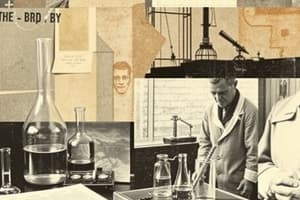Podcast
Questions and Answers
What is the purpose of conducting experiments in science?
What is the purpose of conducting experiments in science?
The purpose of conducting experiments in science is to support or reject hypotheses.
How does a hypothesis become a theory?
How does a hypothesis become a theory?
A hypothesis becomes a theory when it is supported by a significant amount of peer-reviewed experiments.
What is peer review?
What is peer review?
Peer review is the evaluation of a proposed publication by scientists in the same field, who determine its credibility and propose changes if necessary.
What is a scientific theory?
What is a scientific theory?
What is the significance of a scientific theory?
What is the significance of a scientific theory?
What is bias in scientific research?
What is bias in scientific research?
How does bias affect the validity of an experiment?
How does bias affect the validity of an experiment?
What is the purpose of peer review and repeat testing?
What is the purpose of peer review and repeat testing?
What is an example of bias affecting the credibility of experiment results?
What is an example of bias affecting the credibility of experiment results?
How does the scientific method try to avoid bias?
How does the scientific method try to avoid bias?
Flashcards are hidden until you start studying



